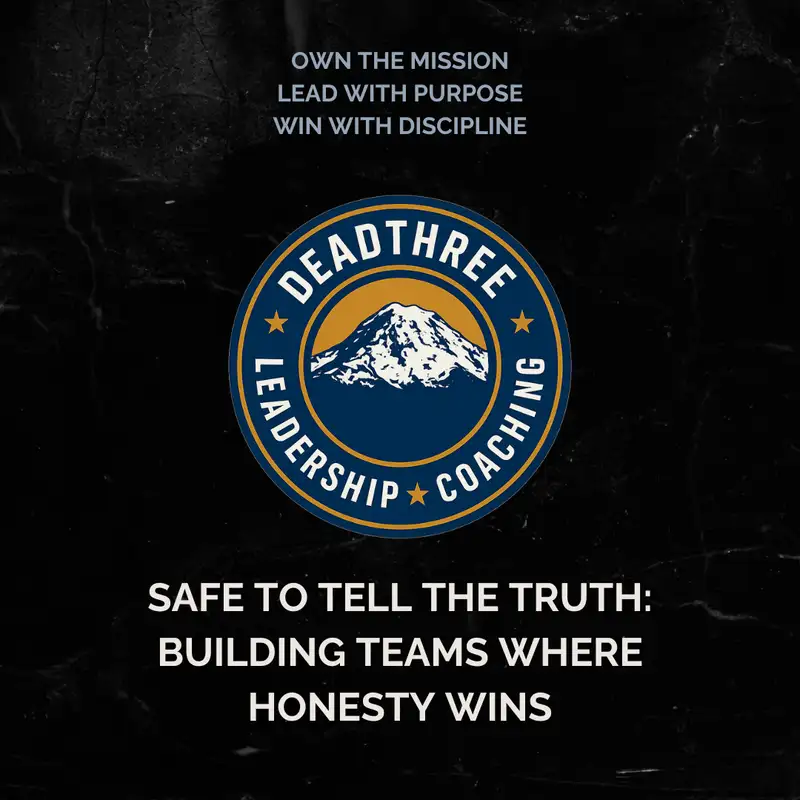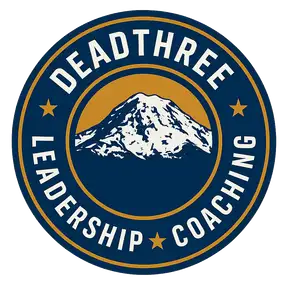Safe to Tell the Truth: Building Teams Where Honesty Wins
Download MP3In this episode of the DeadThree Coaching Show, we dig into the foundation of every elite team: trust that makes truth-telling safe. If someone on your team spots a problem, do they feel safe to say it out loud—or do they go quiet and hope it goes away? Using insights from Patrick Lencioni’s The Advantage, Seth Godin’s Tribes, and real-world leadership examples (including UConn’s Dan Hurley), we unpack why silence is costly and how leaders create environments where people can speak freely, fail safely, and still feel valued.
👉 What you’ll learn
- Healthy vs. Smart Organizations: Why strategy/finance/tech don’t matter if morale is low and politics/confusion are high—and how organizational health starts with trust.
- The Two Kinds of Trust: Reliability (“I’ll deliver Friday at noon”) and psychological safety (“I can ask the hard question without fear”). You need both.
- The Cost of Silence: How unspoken problems bury mistakes, kill innovation, and drain engagement—while the conversation moves to side channels (DMs, hallways, spouses).
- Culture = What You Tolerate: Late arrivals, gossip, disrespect, weak meetings—each one signals what’s really allowed.
- Normalize Productive Conflict: Why intense, purposeful meetings (à la Hurley) surface truth, speed clarity, and accelerate execution.
- Change Feels Dangerous: How human nature resists disruption—and the rituals/language leaders use to make change safe and expected.
⏱ Timestamps
- 00:00 – The test of your culture: will people tell the truth?
- 02:00 – Lencioni’s model: trust → conflict → commitment → accountability → results
- 05:45 – The two kinds of trust and why safety matters
- 08:30 – The real cost of silence (and where the truth goes when it’s not said in the room)
- 12:10 – “Culture is what you tolerate”: practical examples
- 15:10 – Making meetings intense and safe (Hurley example)
- 18:30 – Why change feels dangerous (from Tribes) and what to do about it
- 22:00 – Leadership consistency, accountability, and protecting trust
- 24:30 – Three moves to build truth-safe teams this week
💬 Pull quotes
- “If your people aren’t telling you the truth in the room, they’re already telling someone else.”
- “Your culture isn’t what’s on the poster—it’s what you tolerate.”
- “Make it safe to speak freely, fail safely, and believe deeply that what I say matters.”
🔧 Try this this week (Action Items)
- Run a Truth Audit: Ask the team, “What’s one thing we’re not saying out loud that we need to?” Capture it. Discuss it. Decide next steps.
- Identify Your Tolerances: List 2–3 behaviors you’ve been letting slide (lateness, gossip, unclear ownership). Keep or kill—then communicate the standard.
- Celebrate Honest Mistakes: When someone raises a hard truth or owns an error, acknowledge it publicly and positively. Turn it into a learning moment.
📚 Referenced ideas
- The Advantage (Patrick Lencioni): Organizational health > organizational “smarts.”
- Tribes (Seth Godin): Culture naturally resists change—leaders must make change safe.
- UConn MBB / Dan Hurley: Intense meetings, high standards, high trust.
👥 Who this is for
Leaders, managers, coaches, founders, and team leads who want fewer politics, more clarity, higher morale, and faster execution.
Leaders, managers, coaches, founders, and team leads who want fewer politics, more clarity, higher morale, and faster execution.
🔗 Resources & Next Steps
- Join the DeadThree Community https://community.deadthreecoaching.com
- Work with us on standards, discipline, and execution https://deadthreecoaching.com
Because when honesty is safe, trust rises—and when trust rises, results follow.

